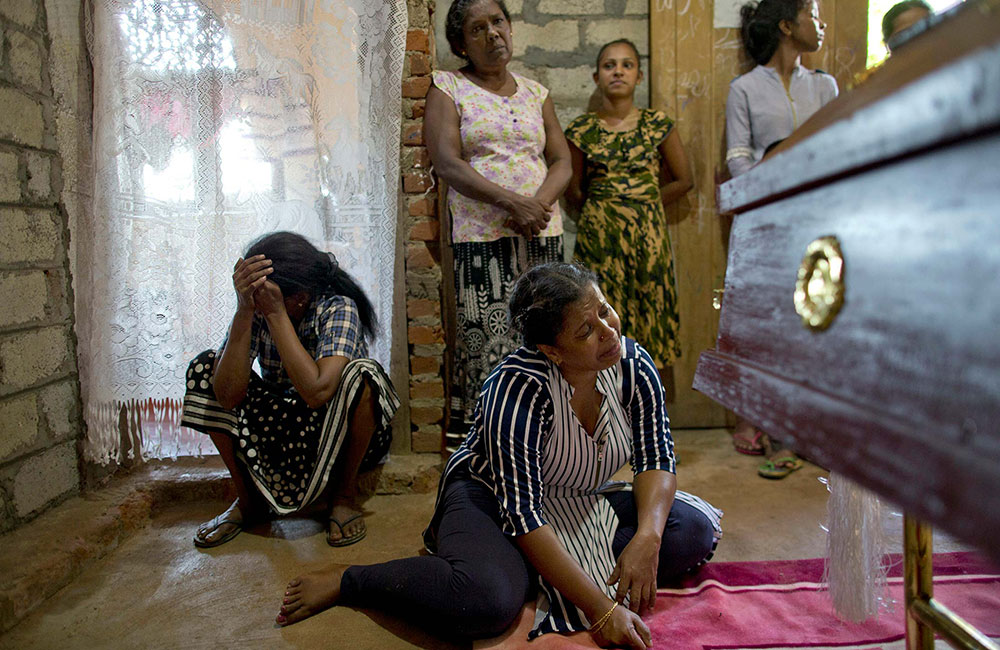The first burials from Sunday’s bombings in Sri Lanka have taken place as the nation began a day of mourning and the death toll mounted.
Three minutes of silence were held across the nation on Tuesday to honour those killed, with the official toll now 310, according to police.
The silence began at 8.30am, coinciding with the start of Sunday’s attacks on Christian worshippers and hotel guests.
At St Sebastian’s, coffins were brought in individually for services in the run-up to a mass memorial beginning mid-morning. “There are so many bodies that we can’t accommodate them all at once,” Anthony Jayakody, auxilliary bishop of Colombo, told AFP.
Flags were lowered to half mast on government buildings, and people bowed their heads but tensions remained high. Bomb disposal squads were called to Kollupitiya railway station in Colombo after an unattended package was found on a train. The US embassy urged people to steer clear of the area before the all-clear was given.
A state of emergency has been brought in and a total of 40 arrests have been made, with the second overnight curfew lifting at 4am.
Parliament is due to convene on Tuesday, with an announcement expected from Prime Minister Ranil Wickremesinghe.
Investigators are now hunting for clues on whether a local Islamist group named as the chief suspect in the attacks – National Thowheeth Jama’ath – received “international support”, said cabinet minister and government spokesman Rajitha Senaratne.
A woman kneels next to a coffin during a mass burial of victims at a cemetery near St. Sebastian Church in Negombo, Sri Lanka. Photograph: Athit Perawongmetha/Reuters A woman kneels next to a coffin during a mass burial of victims at a cemetery near St. Sebastian Church in Negombo, Sri Lanka. Photograph: Athit Perawongmetha/Reuters
A woman kneels next to a coffin during a mass burial of victims at a cemetery near St. Sebastian Church in Negombo, Sri Lanka. Photograph: Athit Perawongmetha/Reuters
National Thowheeth Jama’ath is a newly formed group in Sri Lanka committed to a militant and intolerant Islamist ideology. But though it is known for being a virulently anti-Buddhist and has been linked to the vandalisation of Buddhist statues, it has not previously been linked to terrorism. Four of its members were arrested in January.
Experts say it is unlikely the organisation would have been able to rapidly develop the capability to perpetrate a complex attack involving multiple suicide bombings without very significant outside assistance. Senaratne himself said it was not possible for such “a small organisation” to carry out such well coordinated suicide strikes.
As security forces continued combing Colombo for any more explosives, focus was shifting to the role that infighting within the government may have played in allowing Sunday’s attacks to occur.
An intelligence note detailing the names, targets and whereabouts of possible attackers was circulated in parts of the government but is understood not to have reached the cabinet nor the prime minister. It is unclear whether the country’s security council also considered the warnings.
Sri Lanka’s government has been divided into factions since a constitutional crisis late last year, when the prime minister and his allies stopped being invited to meetings of the country’s top security officials.
On Tuesday at St Anthony’s Shrine in Colombo – where scores died as they gathered for Easter Sunday prayers – a crowd of a few dozen people held candles and prayed silently, palms pressed together.
Some of them struggled to hold back tears and as the three minutes drew to a close, the crowd began to chant prayers.
The attacks were the worst against the country’s small Christian minority, who make up just seven percent of its population of 21 million. It is the worst atrocity since Sri Lanka’s civil war ended a decade ago.
President Maithripala Sirisena’s office said there was intelligence that “international terror groups” were “behind local terrorists” and that he would seek foreign help to investigate.
The state of emergency, which gave police and the military special powers to counter militant strikes, came into force at midnight. Suspects can be detained without a court order.
Tensions remained high and security heavy after a bomb discovered by police on Monday near one of the targeted churches blew up before police could defuse it. Although there was a powerful blast, no injuries were reported.
Police also found 87 bomb detonators at a Colombo bus station.
Details have begun to emerge about some of the foreigners killed in the blasts. The United States reported at least four Americans killed – including a child – and the Netherlands raised their toll to three.
A Danish billionaire lost three of his children in the attacks, a spokesman for his company said.
Eight Britons, eight Indians, two Australians and nationals from Turkey, France, Japan and Portugal, were also killed, according to Sri Lankan officials and foreign governments.
The suicide bombers hit three Colombo luxury hotels popular with foreign tourists – the Cinnamon Grand, the Shangri-La and the Kingsbury – and three churches: two in the Colombo region and one in the eastern city of Batticaloa.
Two additional blasts were triggered as security forces carried out raids searching for suspects.
Interpol said it was deploying investigators and specialists to Sri Lanka, and the US State Department warned of possible further attacks in a travel advisory.
Ethnic and religious violence has plagued Sri Lanka for decades, with a 37-year conflict with Tamil rebels followed by an upswing in recent years in clashes between the Buddhist majority and Muslims.
Agence France-Presse contributed to this report.

Leave your comments
Login to post a comment
Post comment as a guest